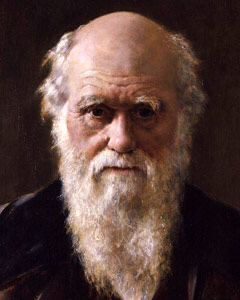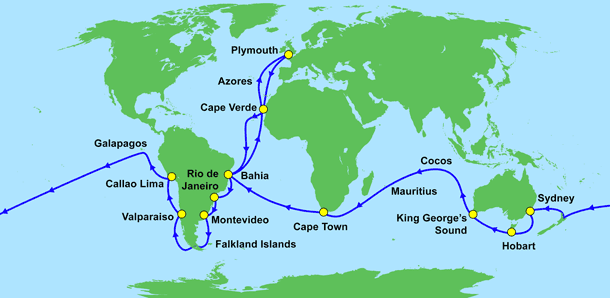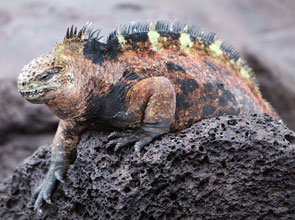
Charles Darwin
1809 - 1882
English naturalist and author of the theory of evolution.
Sailed around the world cataloging and studying new animal and plant species.
Proposed the theory of natural selection to explain variations of species.
Proposed that all species of life have descended over time from common ancestors.
Charles Darwin was an English naturalist. He was born on February 12, 1809 in Shrewsbury, England. He was one of six children and his father was a wealthy doctor and financier. In 1825 Darwin spent the summer helping his father as an apprentice doctor. Later that year he enrolled in the University of Edinburgh Medical School. During his second year, he joined the Plinian Society, a club for students interested in natural history. He assisted physician Robert Edmond Grant as he researched the anatomy and life cycles of marine invertebrates. In 1827 Darwin presented his own discovery that black spores commonly found in oyster shells were in fact the eggs of a leech. His father was unhappy with his interest in natural history and instead wanted him to become a medical doctor. But Darwin became queasy at the sight of blood so his father suggested he study to become a parson instead. In 1828 he was sent to Christ's College at Cambridge, but he was only qualified to take the ordinary degree course. He did well and graduated tenth in his class in 1831. After graduation, Darwin studied geology with Adam Sedgewick in preparation for a trip he wanted to take to the Canary Islands. In addition to his interest in natural history, Darwin also enjoyed reading. He read several scientific books including Natural Theology by William Paley, Alexander von Humboldt's Personal Narrative, and several woks by John Herschel.

While Darwin was studying at Christ's College, botany professor John Stevens Henslow became his mentor. Shortly after he graduated, Henslow recommended him for a position as a naturalist on the HMS Beagle. The ship was commanded by Captain Robert Fitzroy and was leaving for a five-year survey trip around the world. The Beagle set sail on December 27, 1831. During the trip, Darwin read Charles Lyell's Principles of Geology and was particularly impressed with Lyell's findings of geological formations over time. As the expedition progressed, Darwin collected hundreds of specimens of birds, plants, and fossils. He took careful notes and closely observed the principles of botany, zoology, and geology. Most of his zoology notes were about marine invertebrates. He was particularly interested in the Galapagos Islands in the Pacific Ocean. He noted that mockingbirds differed from one island to another. He also noticed slight variations in the shapes of tortoise shells between the different islands. When the Beagle returned to England on October 2, 1836 Darwin was already a celebrity in scientific circles. He brought back so many specimens that there was some concern as to how long they would keep before they could be studied. In 1838 Darwin decided to marry his cousin Emma Wedgewood.

For the next 15 years Darwin continued to work on his findings. In 1853 he received the Royal Society's Royal medal for his work on barnacles, noting that their body parts varied depending on their environment. Continuing his studies, Darwin began to develop a revolutionary theory about the origin of life that was contrary to that of other naturalists at the time. Most naturalists believed that all species came into being at the start of the world or were created over the course of history and remain unchanged. Darwin realized that the slight variations he had observed could only have been created if the animals had gradually evolved to adapt to their environments. He determined that the different species had evolved over time from a common ancestor and that those with certain adaptations were more likely to survive and pass on their genes. Those that failed to adapt died off. He referred to this process as natural selection. After several more years of study, Darwin was ready to introduce his ideas to the world. On November 24, 1859 he published a detailed explanation of his theory of evolution in what is now his most famous work, On the Origin of Species by Means of Natural Selection. It was both wildly popular and heavily debated from the moment of its release. Darwin continued to work and publish more material. After a lifetime of dedicated research, he died in London on April 19, 1882 and was buried at Westminster Abbey. All though his work remains highly controversial among some groups even today, it has become the accepted scientific theory for the origin of life on Earth.




